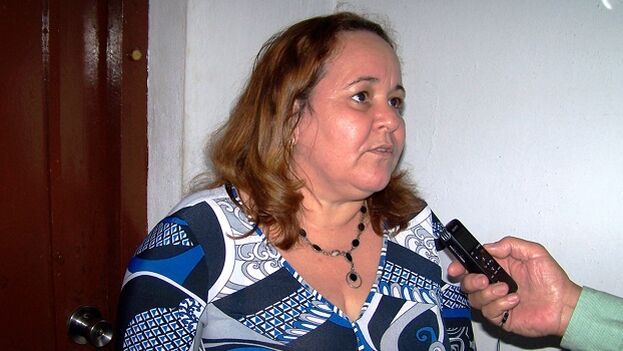
![]() 14ymedio, Madrid, March 6, 2023 — While on a private visit to the Spanish city of Santiago de Campostela, Arelys Falcón Hernandez — the rector of Medical Sciences at the University of Cienfuegos and a member of the Cuban National Assembly — was interviewed by the newspaper Correo Gallego. Falcón responded in ways reminiscent of Fidel Castro until, near the end of the interview, she was asked a question about a possible transition to democracy on the island.
14ymedio, Madrid, March 6, 2023 — While on a private visit to the Spanish city of Santiago de Campostela, Arelys Falcón Hernandez — the rector of Medical Sciences at the University of Cienfuegos and a member of the Cuban National Assembly — was interviewed by the newspaper Correo Gallego. Falcón responded in ways reminiscent of Fidel Castro until, near the end of the interview, she was asked a question about a possible transition to democracy on the island.
Falcón’s name was added to a “list of repressors” compiled by the Foundation for Human Rights in Cuba for having fired a university professor, the engineer David Martinez Espinosa, on October 19, 2021. Martinez had helped publicize a protest march that had been planned, and later repressed, for November 15 of that year. She avoided the topic, claiming that her previous responses were reflections of her personal opinion. “I am not going to make assessments as a deputy of the National Assembly because that is not the purpose of my trip,” she said.
When the interviewer asked if allowing members of the opposition to join the National Assembly was something being considered, Falcón rejected the idea, saying that the Cuban Communist Party, to which she belongs, shall decide the chamber’s composition. “In Cuba there is only one party,” she replied, “but the National Assembly… is a diverse body in which there are people with religious backgrounds, housewives who are unaffiliated… Everyone has the opportunity,” she said.
She claimed that candidates for 50% of the seats are nominated by the population at-large and by large-scale organizations, as though these groups act independently. As far as Falcón is concerned, the process is very transparent. Though Cuban electoral law does state that all citizens in “full enjoyment of their civil rights” can apply and may be approved to be candidates after a review of their qualifications and abilities, an independent candidacy has never been successful.
In April 2015, two independents — Hildebrando Chaviano and Yuniel Lopez — were vying to represent two separate Havana constituencies. Their names did appear on the ballot but their accompanying biographies, scripted by electoral commissions, described them as “counterrevolutionary elements.” Neither was elected.
Falcón did consider it appropriate to comment on other issues, one of them being a possible thaw in relations with the U.S. now that the Democrats are in the White House. She does not see any sign of a rapprochement, rather the opposite. “The Biden government has not lifted a finger to undo any of the measures adopted by the Trump administration,” she complains, adding that Cuba wants to improve relations, but without pressure or conditions. “The allegedly more open attitude of the new American government seems farcical to me,” she said.
As far as Latin America goes, Falcón stated she believes that recent elections there have produced governments in several countries that may be more inclined to look favorably on economic integration, or on creating common markets in which Cuba is a member. She would not go further, however, indicating that Cuba respects the policies of other countries and does not interfere.
Falcón also addressed Cuba’s economic situation, which has grown worse since the start of the war in Ukraine, describing the island as “a country under blockade” that is further plagued by pandemic. She described the relationship with Russia as one of friendship and says that the Cuban government is working “with great hope and great commitment to continue guaranteeing the well-being of the people.” That is why, she said, “Cuba is open to all foreign investment.” She mentioned areas such as pharmaceuticals and tourism, citing Spanish businessmen who have worked for decades on the island with beneficial results for both parties. There may be other investment opportunities, she suggested, that are not in that portfolio but which could be attractive.”
Falcón used her stay in Spain to visit and meet with friends in the healthcare education sector. When asked what main difference she found in the Spanish system, she noted that students entered medical schools the first year of their studies.
_____________
COLLABORATE WITH OUR WORK: The 14ymedio team is committed to practicing serious journalism that reflects Cuba’s reality in all its depth. Thank you for joining us on this long journey. We invite you to continue supporting us by becoming a member of 14ymedio now. Together we can continue transforming journalism in Cuba.
